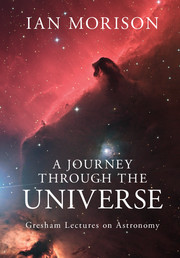Book contents
- Frontmatter
- Dedication
- Contents
- Preface
- Acknowledgements
- 1 Watchers of the skies
- 2 Our Sun
- 3 Aspects of our Solar System
- 4 The rocky planets
- 5 The hunt for Planet X
- 6 Voyages to the outer planets
- 7 Harbingers of doom
- 8 Impact!
- 9 Four hundred years of the telescope
- 10 The family of stars
- 11 Aging stars
- 12 The search for other worlds
- 13 Are we alone? The search for life beyond the Earth
- 14 Our island Universe
- 15 Wonders of the southern sky
- 16 Proving Einstein right
- 17 Black holes: no need to be afraid
- 18 It’s about time
- 19 Hubble’s heritage: the astronomer and the telescope that honours his name
- 20 The violent Universe
- 21 The invisible Universe: dark matter and dark energy
- 22 The afterglow of creation
- 23 To infinity and beyond: a view of the cosmos
- Index
- Plate section
- References
3 - Aspects of our Solar System
Published online by Cambridge University Press: 05 October 2014
- Frontmatter
- Dedication
- Contents
- Preface
- Acknowledgements
- 1 Watchers of the skies
- 2 Our Sun
- 3 Aspects of our Solar System
- 4 The rocky planets
- 5 The hunt for Planet X
- 6 Voyages to the outer planets
- 7 Harbingers of doom
- 8 Impact!
- 9 Four hundred years of the telescope
- 10 The family of stars
- 11 Aging stars
- 12 The search for other worlds
- 13 Are we alone? The search for life beyond the Earth
- 14 Our island Universe
- 15 Wonders of the southern sky
- 16 Proving Einstein right
- 17 Black holes: no need to be afraid
- 18 It’s about time
- 19 Hubble’s heritage: the astronomer and the telescope that honours his name
- 20 The violent Universe
- 21 The invisible Universe: dark matter and dark energy
- 22 The afterglow of creation
- 23 To infinity and beyond: a view of the cosmos
- Index
- Plate section
- References
Summary
How do we know that, given a suitably large bowl, Saturn could float? This chapter (which is not based on a Gresham lecture) will look at our own Solar System as an example of solar systems in general and how astronomers have been able to measure the sizes and masses of the planets – so we can calculate their density and thus discover that Saturn would float in water. It will discuss aspects of planetary orbits, how the Sun’s radiation and the properties of the planets determine their surface temperatures, and how atmospheres form and change during the lifetime of a planet.
What is a planet?
There had never been a formal definition of what should, or should not, be a planet and for some time the minor planet Ceres, which is the largest body in the asteroid belt between Mars and Jupiter, had also been classed as a planet.
In 2005, the discovery of a body (initially called 2003 UB313) was announced. It is slightly larger than Pluto and was at a distance of 96.7 AU from the Sun (three times the distance of Pluto). This required a decision as to whether it should become the 10th planet of the Solar System or whether, instead, Pluto should be demoted. Pluto is considerably smaller than it was thought to be when first discovered and has a highly elliptical orbit inclined at a large angle to the plane of the Solar System. Should it have been discovered in recent times, it is highly unlikely that it would have been given the status of a planet.
- Type
- Chapter
- Information
- A Journey through the UniverseGresham Lectures on Astronomy, pp. 26 - 37Publisher: Cambridge University PressPrint publication year: 2014



